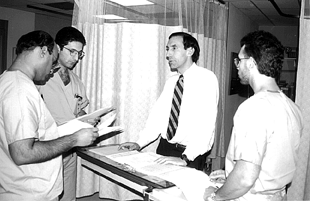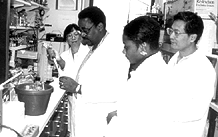
How would you describe the quality of mentorship you received as a young scientist on the way up?
Coleman: The mentors who were influential in steering me toward biomedical research shared the uncanny ability to recognize the potential in me-and the willingness to take exceptional measures to provide me with the opportunities for a scientific career. Let me elaborate. I began my undergraduate schooling as a music major. I quickly realized the limited possibilities for a career in music, especially for a black organist. I toyed with the idea of going to medical school but lacked the financial support to pursue such an idea. Being young and foolish, I left Alabama for Atlanta to pursue broader opportunities.
I visited Mary Reddick, chair of the Biological Sciences Department at Atlanta University. I had not even applied for admission and had no financial means for graduate school. Before examining my transcript, Dr. Reddick accepted me conditionally, requiring me to perform general laboratory assistance, i.e., clean mice cages. I enthusiastically accepted her offer. That was the turning point in my education and my career. She was a unique role model-a black female scientist who overcame immeasurable barriers. She demanded that I achieve goals that seemed beyond my limits, and yet she was caring and I knew that she would not allow me to falter. After Dr. Reddick, I had three other mentors who played important roles in guiding me toward biomedical research-Drs. Lafayette Frederick, Frissell Hunter, and Luther Williams. They provided me with fellowship support and laboratory resources.
Masur: My mentor at Cornell was, I suspect, fairly typical of a successful mentor. He was an impressive role model for young physicians in that he was a superb clinician yet he was also widely published. His knowledge of parasitology, his perspective on the relative importance of issues, his ability to criticize me and others in a constructive manner, and his generosity in allowing me to develop my own career enhanced my enthusiasm and productivity. More importantly, they imbued me with a sense that science was both important and fun. There are many mentors here at NIH like him. Across the country, however, there are not enough similar individuals to accommodate all the promising young scientists or, more specifically, not enough mentors with funding so that they can afford to spend the time both pursuing science and being a mentor.
 |
Coleman: I firmly believe that senior scientists have an obligation to train the next generation of scientists. We need to recognize those who have the potential to become first-rate scientists and to inform others about career options that benefit from scientific training, such as work as science policy makers, science administrators, science writers, and, very importantly, science teachers. For more than a decade, I've taught a grad-level course in bacterial physiology at Howard University. This allows me an added arena for mentoring.
Masur: Our department invests considerable effort in identifying fellow candidates who have the intelligence and the drive to be successful. Persuading such candidates to come to NIH requires considerable effort, but is clearly time well spent. After they come, we try to set challenging goals and then to provide a steady stream of positive reinforcement combined with constructive criticism and further opportunities for the individual to develop a scientific identity of his or her own. During fellows' research years, I think that they need to be provided with adequate scientific, technical, and administrative resources so that they can be successful. They need regular feedback that they are headed in the right direction, that their techniques are appropriate and that their endproduct is both attainable and important.
What is the most difficult aspect of mentoring? The most rewarding?
Coleman: The time and energy required for mentoring should not be underestimated. However, I found that at the NIH, one of the major difficulties is laboratory space. When summer research students arrive, I scramble to find a small lab bench space for them, and they often have to sit in the hallway to read.
Reward is measured by the success of the students I've mentored and the realization that in some small ways, I might have contributed to their success. ... The first student I mentored is now a thoracic specialist practicing in California. Two years ago, I had a high-school student from Washington, D.C. She was a bright and hard-working student. I was pleased to read in the news that she was honored in a presidential ceremony, having been selected by the Children's Defense Fund as a student who had succeeded despite immense hurdles. Others are similarly successful in various scientific careers. Some are faculty members in research institutions, researchers in biotech firms, and many are physicians.
Masur: It is difficult to offer criticism in a way that is constructive to the project and to the trainee's intellectual development. It is rewarding to see trainees succeed, but the mentor-trainee relationship is often a precarious one. There comes a time when fellows need to establish their independence in another lab or at another institution, even though their work under their mentor is productive and convenient for both parties. Certainly, there are many examples of mentors who are threatened by the success of their trainees, who cannot admit that great ideas at some point might be the exclusive creations of the trainee, and who thus end their relationship in a manner that creates unhappiness and may be destructive to one (or occasionally both) careers. For me, however, it is rewarding to see trainees embark on careers that are scientifically productive, and which they themselves perceive as worthwhile and productive.
What concrete advice do you have for other scientists who are assuming the role of mentor or who would like to improve their mentoring skills?
Coleman: Provide a nurturing and supportive environment in the laboratory; assign students specific meaningful projects. Do not view students as "just an additional pair of hands"; acknowledge their contribution to the project. ... Elicit family support in a student's commitment to time and energy in laboratory research (i.e., that it is not a 9-to-5 job and often requires them to work on weekends). Serve as a role model who teaches, counsels, and opens career doors.
What advice do you have for young scientists when it comes to improving their relations with their mentors?
Coleman: Be aggressive and learn as much as they can; learn not only about the project in which they are involved but also how it relates to a larger picture; learn how their mentor chose his/her career path; learn career options.
Masur: Young scientists early in their relationship with their mentors need to establish goals and expectations that are realistic. They also need to establish the ground rules: how long will the training period be, what resources will be available such as technical help and supplies and space, what are the prospects for a permanent position, what salary and benefits will be available, and what will the authorship policy be early and later in the relationship? These are sensitive issues, but the mentor owes it to the trainee to be specific about these issues and to update the trainee about changing prospects for first authorship, support, etc.
 |
Coleman: When I came to NIH in the ë70s, I was often told that NIH is a research institution, not a teaching institution. Therefore, there was no emphasis placed on NIH scientists to be mentors. I've noticed a slow shift in culture and attitude toward mentoring. The fact that The Catalyst is interested in this subject is a clear statement acknowledging that change. While individual scientists need to make their own commitments to train the next generation of scientists, it requires the support of the NIH leadership to make mentoring a valued activity. Promotion for intramural scientists should take into account mentoring activities. Mentorship may not result in publications, yet such activities are necessary and take time and energy.
Masur: NIH is a wonderful place to be a mentor since there are such outstanding resources available in both clinical and basic science areas. Many perceive NIH's sole mission as being the production of superb research: when promotions and resources are allocated, there is not always a clear understanding concerning the importance of training and mentorship and how the value of those activities compares with research productivity. This is evident by the fact that some superb scientists and labs invest in training and mentorship, while others do not. If a trainee is to be successful, part of the resources that he or she needs include a training period that is long enough for the trainee to develop the skills and produce the publications necessary to obtain a first-rate job. Other necessary resources include lab supplies, administrative assistance, and travel to professional meetings. NIH needs to track the accomplishments of their trainees who leave NIH, and make sure that the investment in training is paying off. If NIH trainees are not meeting expectations when they leave, NIH should modify its training programs and mentorship policies. If one looks at the success of the many M.D.s and Ph.D.s who have trained at NIH and then left over the past 20 years, it's clear that many of NIH's training programs have been fabulously successful, and we should continue investing heavily in this worthwhile endeavor. However, we need to continuously monitor our "products." Lastly, it is important to point out that NIH offers courses through the FAES [Foundation for Advanced Education in the Sciences] that greatly facilitate training. These courses, and the recent introduction of a clinical research core curriculum by Clinical Center Director John Gallin, need to be supported and expanded since they add substantially to what one lab-or mentor-can provide.